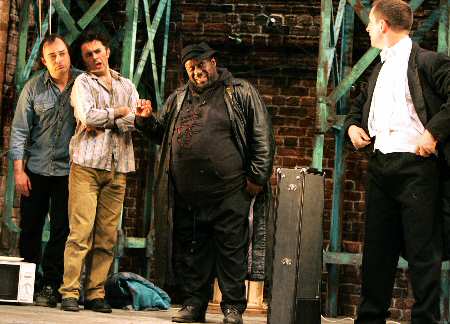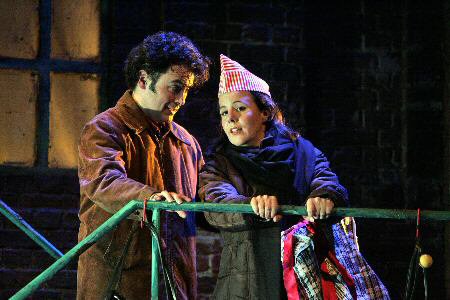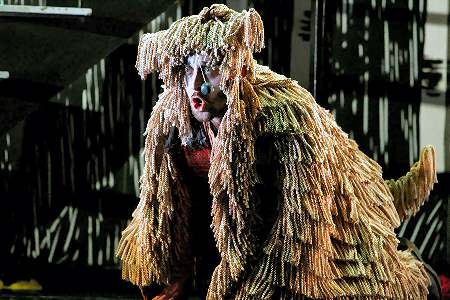Error processing SSI file |
||||
|
Editor: Marc Bridle
Webmaster: Len Mullenger
|
Seen and Heard
Opera Review
ETO in Exeter (II) Puccini La Bohème (23/11 ) and Janácek The Cunning Little Vixen (24/11 ) Soloists and Orchestra of English Touring Opera, Northcott Theatre, University of Exeter, 23rd and 24th November 20024 (BK)
Following on from their splendid Tobias and the Angel on the 6th of November, ETO returned to Exeter this week for their annual season, with a new Bohème and a revival of their Cunning Little Vixen from 2002 - a co-production with Opera Theatre (Ireland). Both have arrangements for small orchestra by Jonathan Dove.
Typically for this enterprising company, each of the productions has some innovative ideas. Annilese Miskimmon’s Puccini is a verismo setting in which the modern day Bohemians live in a seedy industrial space rather than a garret, the Café Momus is a hot dog stall and Marcello earns his living in Act 3 painting signs for a strip-joint. It is (Miskimmon says) an exploration of the realities of poverty today and of the isolation experienced by today’s immigrants (legal or otherwise) in many of Europe’s capital cities.
Marcello, Rodolfo, Colline and Schaunard in La Bohème
Without the financial resources or the luxuries of
space that bigger companies command, ETO necessarily needs to make
compromises in its productions. So, in addition to its small orchestra
this Bohème is presented without a chorus and has
no soldiers, children, or toy seller in the second act. This means
that it is also severely cut so that the half-way interval arrives
after only fifty minutes which feels rather like short change.
Having said this, Dick Bird’s simple sets and the lighting plot by Colin Grenfell contributed nicely to a musically enjoyable evening guided along expertly by Philip Walsh from the pit. After a slightly stilted start in terms of stage action - this was the first night in Exeter - the company soon settled down to give excellent performances. Tamsin Coombs made a splendid Mimì, deliberately tentative and uncertain in the first act and touchingly more tragic as her illness progressed. Always sure of tone, hers was one of the most believable performances of this role that I have ever seen.
An exceptional Mimì needs a good Rodolfo, provided here by Amos Christie’s light sounding but nonetheless pleasing tenor. He managed the big arias with ease, contributed to the men's ensembles with gusto and made a sympathetic and likeable hero. Even the business of him hiding Mimì's key seemed good-natured in this portrayal.
Marcello and Musetta (Douglas Bowen and Charlotte
Ellett) were both in terrific form while Keel Watson (Colline), Joe
Corbett (Schaunard) and Deryck Hamon (Benoit) all acted and sang with
the assured professionalism that is ETO's hallmark. All in all this
was a thoroughly pleasing production which must have satisfied seasoned
opera goers as much as it moved the newbies.
In James Conway's Vixen we get two operas in one - the first about humans and the other about animals. Janácek's intention for the work was always that some of the singers playing human parts should play animal parts as well - the Priest was to play the Badger for example. What happens in this production though is that every singer plays several different parts.
Mr. Conway's view is that the Vixen is by no means a pretty story about forest animals. Instead it shows how cyclic nature (implacable and amoral as it is) provides all life with the same needs and motives. But while animals arrange their dominance patterns, breed, kill and consume without moralising, humans dissemble. We may claim superiority, but we're more animal than we admit; and we can't quite square up to our instincts.
To illustrate this somewhat Freudian interpretation, two new characters are presented, the Headman of the human group and the young woman, Terynka, a character mentioned in Max Brod's German translation of Janacek's text but usually never seen. The character of the pedlar Harasta is also promoted and developed.
This production presents the humans as a close-knit community dominated by the ageing Headman. He is losing his authority and realises that he must nominate a successor. Since most the girls in the group are now marriageable, the Headman and decides that Terynka will marry Harasta and together they will become the group's new leaders. To celebrate the wedding and to ease the painful rite of passage, the group re-enacts the story of the Sharp Ears the Vixen, in which the animals’ behaviours parallel or contrast with those of the humans. The production was staged by Opera Theatre (Ireland) at the Brno Janácek Festival last year to great acclaim.
While Bohème was sung in Italian (with surtitles) the Vixen was sung in English but also had surtitles. Given that essentially all the cast had excellent diction, the question really ought to be asked whether this was strictly necessary or even helpful. There is such a lot going on in this production (it's more complicated in some ways than Ariadne auf Naxos) that the additional distraction of compulsively reading the titles must surely have eroded its subtleties for some people.
Each set of the matched roles does point up similarities or contrasts between the different characters portrayed. The Forester for example (a sexually frustrated man with a failed marriage) is also the Headman of the enactment group (a character whose power is waning.) By contrast, the impotent Teacher plays the Mosquito and the Cockerel for each of whom some form of penetration is a genuine 'fact of life.'
The character of the Vixen herself is matched only with Terynka, while Harasta plays also the Forester / Headman's submissive but rebellious Dog and the and a Poache. Since Terynka is doppelgänger to the Vixen's sexuality, the entire thing is a field day for Freudians (especially Anna Freudians) spotting ego-defensive identifications.
The production looks good too with interesting designs from Joanna Parker (the front of the stage is littered with human rubbish just like some animals' dens) and fine lighting by Simon Corder. While all of the animal costumes are convincing, the Dog looks especially impressive particularly when he's on all fours.
The singing was uniformly excellent on Wednsaday with particularly fine performances from Roderick Earle (Forester / Headman,) from Louise Walsh (Terynka / Vixen, ) Clarissa Meek (Golden Mane the Dog Fox,) Dwayne Jones (Teacher / Mosquito/ Cockerel) and from the un-named local boy who played the Frog.
My only disappointment was with Jonathan Dove's orchestral reduction. No blame to either Mr. Dove or to conductor to Peter Robinson for their fine musicianship though: I just missed Janácek's orchestral sound.
Pictures by Keith Pattison
Back to the Top Back to the Index Page |
| ||
|
||||






